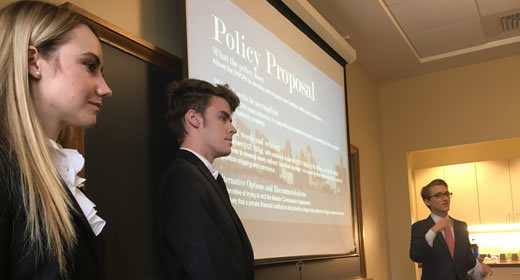
The Ford School Case Competition, launched in 2014, offers public policy students an opportunity to conduct a real-world consulting project in a time-limited, competition format.
Each year, a local government or nonprofit partner challenges students with a real-world policy problem, which is announced around the midway point of the fall semester. Students then have 10 days to conduct research, identify a viable policy solution, and present their recommendations to a panel of judges.
“The Ford Case Competition really gives students the chance to apply the skills they’re learning in the classroom to actual policy problems,” said Meredith Reid, co-president of the Ford Case Collective (FCC), the student organization that plans and coordinates the event. “It also allows the Ford School to continue to build its brand and demonstrate the quality of its students.”
In its inaugural year, the Ford Case Collective worked with Nathan Triplett (MPP '09), mayor of the City of East Lansing, to design a case aimed at resolving the city’s downtown parking concerns. Five then-first-year MPP students delivered the winning proposal as determined by a panel of city administrators and Ford School faculty. Later, the team was invited to present its proposal to the East Lansing City Council.
For the 2015 competition, the Ford Case Collective partnered with the Detroit Wayne County Port Authority. Teams were tasked with developing proposals to help the Port Authority increase revenues and build capacity to better position it to play a greater role in the city’s resurgence. A team of three Ford School undergraduate students—(pictured here, left to right) Victoria Noble (BA ’17), James Hendrickson (BA ’17), and Carson Smith (BA ’17)—bested five other teams to take home the top prize.
Since the competition, the Port Authority has remained in contact with the team and recently notified them of its intention to move forward with proposed policy changes similar to those the team suggested. “It’s great to see that we were able to help make a substantive impact,” said Hendrickson.
While much of the focus of the challenge is on the competition itself, participants also have the opportunity to engage in professional development sessions with alumni mentors and representatives from partnering organizations, which helps students better understand the work of public sector consultants.
The exposure led Noble to explore internship opportunities with consulting firms, something she hadn’t previously considered. “Consulting wasn’t really on my radar before the case competition, but it ended up being what I chose to do,” said Noble, who will spend the summer with Hamilton Place Strategies, a Washington, DC-based strategic communications consulting firm.
For more information on the Ford Case Competition, visit FCC’s Facebook page, or contact Alli Zimmerman (MPP ’17) or Karen Yocky (MPP ’17).
--Story by Paul Gully (MPP '16)